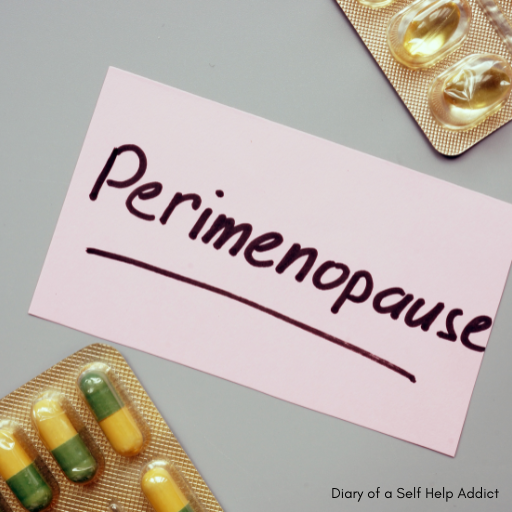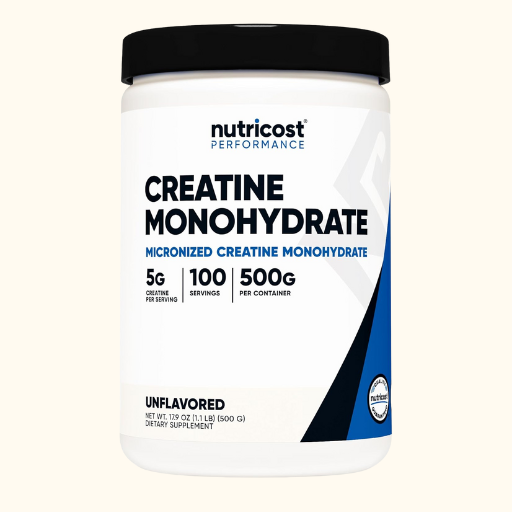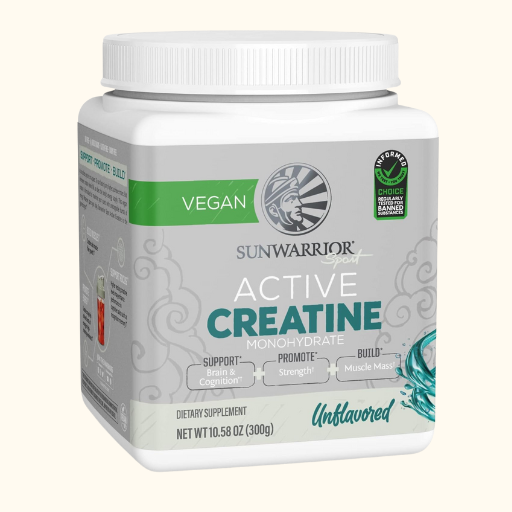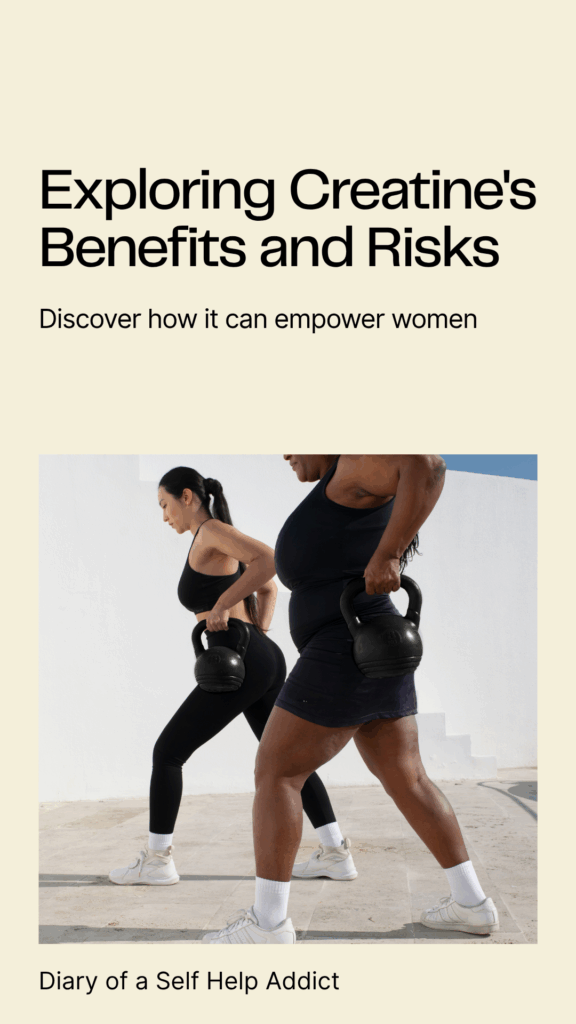
Creatine is one of the most extensively researched and widely used supplements in the sports and wellness world. While it has long been associated with bodybuilders and elite athletes, creatine is now gaining recognition as a powerful tool for energy production, muscle and bone support, and even brain health—particularly in aging populations and women navigating hormonal transitions, such as perimenopause.
So, what exactly is creatine? Is it safe? Who should consider taking it, and who might want to avoid it? Let’s break down the science, debunk the myths, and explore the emerging research surrounding this fascinating supplement.
What is Creatine?
It is a naturally occurring compound found in your muscles and brain; made from three amino acids: arginine, glycine, and methionine. About 95% of your body’s creatine is stored in muscles, where it helps produce adenosine triphosphate (ATP)—the primary energy currency of the cell. The remaining 5% resides in the brain, kidneys, and liver.
While your body produces creatine on its own, it’s also found in animal-based foods, such as red meat and seafood. However, to get the amounts often used in studies (typically 3-5 grams per day), supplementation is usually necessary.
What Are the Benefits?
1. Increased Energy and Exercise Performance
Creatine helps replenish ATP more quickly during short bursts of high-intensity activity. This translates into better strength, speed, and endurance during workouts.
2. Muscle Growth and Maintenance
It supports muscle protein synthesis and cellular hydration. Over time, it may contribute to increased lean muscle mass and improved recovery.
3. Bone Health
Emerging research suggests that creatine may positively impact bone density, especially when combined with resistance training. This is particularly relevant for aging populations at risk for osteoporosis.
4. Brain Function and Cognitive Support
Creatine has shown promise in supporting cognitive performance, especially under conditions of mental fatigue, sleep deprivation, and neurodegenerative diseases. It’s being studied for its neuroprotective effects in aging adults.
5. Mood and Mental Health
Some studies have linked creatine supplementation to improved symptoms of depression and anxiety. It’s thought to support brain energy metabolism and neurotransmitter function.
6. Perimenopause and Menopause Support
During perimenopause, fluctuating hormone levels can lead to muscle loss, fatigue, brain fog, and decreased bone density. Supplementation may help mitigate these effects by supporting energy metabolism, muscle strength, and cognitive clarity. According to a 2023 article from The Pause Life, creatine has the potential to be a hormone-free tool for improving overall well-being during midlife transitions (3).
Related Read: DMSO: THE PAIN-RELIEVER THAT SMELLS LIKE GARLIC
Are There Any Risks or Side Effects?
Creatine is generally considered safe for most people when taken at recommended doses. According to the Mayo Clinic, short-term use (up to 6 months) in healthy individuals has not been associated with significant adverse effects. Long-term safety is still being researched, but no major safety concerns have been identified.
Potential Side Effects:
- Water retention: Creatine can cause muscles to retain water, leading to temporary weight gain.
- Digestive issues: Some users report bloating or stomach cramps, especially when taking high doses.
- Kidney stress (in high-risk individuals): While there’s no solid evidence that creatine damages kidneys in healthy individuals, those with pre-existing kidney conditions should consult a doctor before starting supplementation.
According to the Cleveland Clinic, it is safe for most people but should be used responsibly and in alignment with individual health needs.
Who Should Consider Taking Creatine?
1. Athletes and Fitness Enthusiasts
If you’re engaged in regular strength training or high-intensity workouts, creatine can enhance performance, recovery, and muscle development.
2. Adults Over 40
Aging is accompanied by muscle loss (sarcopenia) and decreased energy production. Creatine may help combat these changes, especially when paired with resistance training.
3. Women in Perimenopause and Menopause
Hormonal shifts can lead to fatigue, cognitive decline, and muscle loss. Creatine may offer gentle yet effective support without the side effects of hormone therapy.
4. Vegetarians and Vegans
Because it is primarily found in animal products, individuals on plant-based diets often have lower natural stores and may benefit from supplementation.
Who Should Avoid This Supplement?
- Individuals with Kidney Disease: If you have pre-existing kidney issues or are at risk, creatine supplementation should be avoided unless supervised by a healthcare provider.
- Pregnant or Breastfeeding Women: There isn’t enough conclusive research on creatine safety in these populations.
- Children Under 18: Unless prescribed by a doctor for a medical condition, supplementation is not generally recommended for children or teens.
- People Taking Certain Medications: Creatine may interact with medications that affect kidney function or blood sugar levels.
Always consult a healthcare provider before starting any supplement, especially if you have underlying health conditions or are taking medications.
Related Read: EXPLORING GLUTATHIONE: BENEFITS, RISKS, AND PERSONAL INSIGHTS
Creatine for Women in Perimenopause: A Promising Ally

The transition into perimenopause can be physically and emotionally taxing. Decreased estrogen can lead to a host of issues, including:
- Loss of muscle mass and strength
- Slower recovery from exercise
- Brain fog and memory lapses
- Mood swings and fatigue
Creatine may be uniquely beneficial in this life stage. Studies suggest that women respond particularly well to creatine during times of hormonal fluctuation, potentially due to the increased demand for cellular energy and brain resilience.
Potential Benefits Include:
- Enhanced muscle strength and endurance
- Support for lean muscle maintenance and bone density
- Improved cognitive function and memory
- Reduction in mental fatigue and mood swings
While more gender-specific research is needed, the existing evidence is encouraging.
My Personal Testimonial
I’ve been researching mono-creatine supplements for years—deciding whether it’s something I want to add to my regimen for energy, muscle and bone health, and neurocognitive protection. Although I’ve tried my husband’s mono-creatine supplement a few times before a workout, I’ve never been consistent enough to show a noticeable difference.
That said, the few times I’ve taken it, I noticed a short burst of energy during my workout. That “edge” was enough to spark my interest in diving deeper into the research, especially now that I am approaching menopause and am more focused on longevity and whole-body health.
I’m leaning toward a more consistent trial soon, where I’ll track changes in strength, energy, and cognitive clarity.
How to Supplement Creatine Safely
- Type: Creatine-monohydrate is the most studied and recommended form.
- Dosage: 3–5 grams daily. Some protocols include a loading phase (20 grams per day for 5-7 days), but it’s not necessary for everyone.
- Timing: This can be taken pre- or post-workout; consistency matters more than timing.
- Hydration: Stay well-hydrated to support kidney function and cellular hydration.
Kelly’s Thoughts
Creatine is far more than a bodybuilding supplement. It’s a multifaceted molecule with benefits that span physical performance, cognitive health, and hormonal transitions, such as perimenopause. For many women, it represents a low-risk, high-reward supplement worth considering.
As always, individual needs vary. Start small, monitor your progress, and discuss your goals with a knowledgeable healthcare provider.
Have you tried creatine or considered adding it to your health regimen? Share your experience or questions in the comments below!
Shop For Creatine


Disclaimer:
This blog post is for educational and informational purposes only and is not intended as medical advice. Always consult with your physician or a qualified healthcare provider before starting any new supplement, especially if you are pregnant, breastfeeding, taking medications, or have any pre-existing health conditions. As an Amazon Associate, I earn from qualifying purchases at no added cost to you. Thank you for supporting my small business! Read my Privacy Policy here.
References:
- Mayo Clinic. Creatine: What it is, what it does, and its side effects. https://www.mayoclinic.org/drugs-supplements-creatine/art-20347591
- Cleveland Clinic. Creatine Supplementation. https://my.clevelandclinic.org/health/treatments/17674-creatine
- The Pause Life. Creatine Benefits in Menopause. https://thepauselife.com/blogs/the-pause-blog/creatine-benefits-in-menopause
Pin it for later


This is such helpful information. I entered menopause about 6 years ago and still struggle with terrible hot flashes and brainfog. I wonder if creatine would help. I heard of creatine, but didn’t know what it was used for. Your article really helped me learn more. Loved reading and found that this is something to consider! Thanks so much for sharing!
This such an enlightening guide! Thanks for sharing!😁
I knew about the fitness benefits, but had no idea it also supports the brain and hormones! Thanks for sharing!
This is really helpful! I tend to think of creatine as a body builder thing, which isn’t me. Now I see this could be pretty helpful, probably for some others in my family as well.
Thank you for breaking all this down, so helpful and informative!!
I’m in a strange stage where I think im hitting perimenopause so maybe this would help. Thank you!
You know what, I have creatine in my supplements cabinet and I NEED to start taking it. Seems like a simple thing to add into my routine to get so many benefits from! We have also used the sun warrior brand and liked it!
Great points. Thanks for sharing this as well as noting who should avoid this!
This is very informative and interesting! I may research this a little more and consider it! Thank you for sharing
Very interesting read, thank you for sharing! I’ve been taking creatine occasionally and at low dose to help with mood and some muscular issues I’ve been having, it certainly hasn’t made me feel worse! My husband also mentioned that it’s supposed to improve cognitive function even in children, even though as you mentioned there might not be enough studies on its safety.